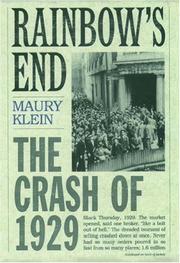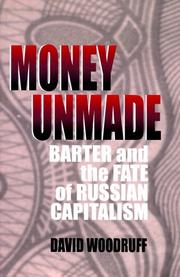| Listing 1 - 7 of 7 |
Sort by
|
Book
ISBN: 9781837720637 Year: 2023 Publisher: Cardiff : University of Wales Press,
Abstract | Keywords | Export | Availability | Bookmark
 Loading...
Loading...Choose an application
- Reference Manager
- EndNote
- RefWorks (Direct export to RefWorks)
Financial Gothic explores the persistent concern of American Gothic literature with finance – and finance as having always been a gothic phenomenon – from 1880 to the present day. The study reads Frankensteinian monsters, haunted houses, vampires and zombies in American literature and film as cultural responses to such twentieth and twenty-first century financial phenomena as the 1929 Wall Street Crash, post-war housing debt, financial deregulation, and the 2008 Credit Crunch. Consideration is also given to the pre-existing consensus on racial readings of American gothic, and how these interpretations of the slave trade can be expanded upon in conversation with their financial contexts. Drawing on contemporary insights into financialised understandings of economics within the humanities, new analysis of finance as an inherently gothic phenomenon, and archival work completed on the Library of Congress’s Black History Collection, Financial Gothic highlights an as-yet-unrecognised dimension of haunting and monstrosity within American gothic fiction.
Finances --- Krach boursier (1929) --- Traite des esclaves --- Dans la littérature.
Book
Year: 1981 Publisher: Paris : Payot,
Abstract | Keywords | Export | Availability | Bookmark
 Loading...
Loading...Choose an application
- Reference Manager
- EndNote
- RefWorks (Direct export to RefWorks)
Crise économique (1929) --- Crise économique (1929) --- Krach boursier (1929) --- Etats-unis --- Crise économique (1929) --- Crise économique (1929) --- Krach boursier (1929) --- Etats-unis
Book
ISBN: 9782251381015 2251381015 Year: 2009 Volume: 100 Publisher: Paris : Les Belles Lettres,
Abstract | Keywords | Export | Availability | Bookmark
 Loading...
Loading...Choose an application
- Reference Manager
- EndNote
- RefWorks (Direct export to RefWorks)
Krach boursier (1929) --- Crise économique (1929) --- États-Unis --- Conditions économiques --- 1918-1945
Book
ISBN: 9789086794713 Year: 2013 Publisher: Place of publication unknown Roularta Books
Abstract | Keywords | Export | Availability | Bookmark
 Loading...
Loading...Choose an application
- Reference Manager
- EndNote
- RefWorks (Direct export to RefWorks)
Beurskrach, 1929 --- Black Tuesday, 1929 --- Great Crash, 1929 --- Krach boursier, 1929 --- Stock Market Crash, 1929 --- Wall Street Crash, 1929 --- crise financiere --- bourse --- histoire economique --- financiele crisis --- beurs --- economische geschiedenis --- Money market. Capital market --- International finance --- anno 1920-1929 --- United States --- Depressions --- 1929 --- Social conditions --- 1918-1932 --- United States of America

ISBN: 0195135164 0195158016 1602567034 0198030908 1280655380 0195302354 9780195158014 9780198030904 Year: 2001 Volume: *1 Publisher: Oxford Oxford University Press
Abstract | Keywords | Export | Availability | Bookmark
 Loading...
Loading...Choose an application
- Reference Manager
- EndNote
- RefWorks (Direct export to RefWorks)
The Crash of '29 is one of the key moments in American, and indeed world history. This narrative historian addresses its effects on both business and society, and recreates the coming together of economic forces culminating in this disaster.
History of North America --- anno 1920-1929 --- United States --- Beurskrach, 1929 --- Black Tuesday, 1929 --- Great Crash, 1929 --- Krach boursier, 1929 --- Stock Market Crash, 1929 --- Wall Street Crash, 1929 --- Depressions --- Stock Market Crash, 1929. --- US / United States of America - USA - Verenigde Staten - Etats Unis --- 331.162.1 --- #KVHA:Geschiedenis; Verenigde Staten --- #KVHA:Economie; Verenigde Staten --- #KVHA:Politiek; Verenigde Staten --- #KVHA:American Studies --- Geschiedenis van de financiële markten. --- New York Stock Exchange --- History. --- Economic conditions --- E-books --- Depressions. --- Economic Theory --- Business & Economics --- Crash, Stock Market, 1929 --- Stock Exchange Crash, 1929 --- Financial crises --- Great Depression, 1929 --- 1929 --- 1918-1945 --- History --- NYSE --- Bourse de New York --- New York (N.Y.). --- Nyū Yōku Kabushiki Torihikijo --- New York (City). --- New York Stock and Exchange Board --- N.Y.S.E. --- N.Y. Stock Exchange --- Nʹi︠u︡-Iorkskai︠a︡ fondovai︠a︡ birzha --- Нью-Иоркская фондовая биржа --- NYSE Amex --- Geschiedenis van de financiële markten --- United States of America
Book
ISBN: 1529202140 1529205530 Year: 2023 Publisher: Bristol : Bristol University Press,
Abstract | Keywords | Export | Availability | Bookmark
 Loading...
Loading...Choose an application
- Reference Manager
- EndNote
- RefWorks (Direct export to RefWorks)
Simon Wren-Lewis' widely-read Mainly Macro blog is an influential resource for policymakers, academics and social commentators. This book tells how damaging political and economic events of recent years became inevitable and serves as a warning to avert future disasters on this scale.
Brexit --- Crises financieres --- Financial crises --- Crashes, Financial --- Crises, Financial --- Financial crashes --- Financial panics --- Panics (Finance) --- Stock exchange crashes --- Stock market panics --- Crises --- Courses aux guichets --- Crises bancaires --- Crises boursières --- Débâcles boursières --- Débâcles financières --- Krachs --- Paniques bancaires --- Paniques boursières --- Paniques financières --- Bulles spéculatives --- Cycles financiers --- Krach boursier (1929) --- Krach boursier (1987) --- South Sea Company, Bulle spéculative de la (1720) --- Tulipomanie (Pays-Bas ; 1634-1637) --- Crises économiques --- Marché financier --- Procédure de retrait de la Grande-Bretagne de l'Union européenne (2016-....) --- Retrait de la Grande-Bretagne de l'Union européenne (2016-....) --- Sortie de la Grande-Bretagne de l'Union européenne (2016-....) --- Sortie du Royaume-Uni de l'Union européenne (2016-....) --- Référendum --- History --- Great Britain --- Anglia --- Angliyah --- Briṭanyah --- England and Wales --- Förenade kungariket --- Grã-Bretanha --- Grande-Bretagne --- Grossbritannien --- Igirisu --- Iso-Britannia --- Marea Britanie --- Nagy-Britannia --- Prydain Fawr --- Royaume-Uni --- Saharātchaʻānāčhak --- Storbritannien --- United Kingdom --- United Kingdom of Great Britain and Ireland --- United Kingdom of Great Britain and Northern Ireland --- Velikobritanii͡ --- Wielka Brytania --- Yhdistynyt kuningaskunta --- Northern Ireland --- Scotland --- Wales --- Economic policy --- Politics and government

ISBN: 1501711466 9781501711466 0801436605 9780801436604 0801486947 9780801486944 Year: 2018 Publisher: Ithaca, NY
Abstract | Keywords | Export | Availability | Bookmark
 Loading...
Loading...Choose an application
- Reference Manager
- EndNote
- RefWorks (Direct export to RefWorks)
Since the collapse of the Soviet Union, Russians have seen the ruble steadily lose ground to alternative means of payment such as barter and privately issued quasi-monies. Industry now collects as much as 70 percent of its receipts in nonmonetary form, leaving many firms with too little cash to pay salaries and taxes. In this ground-breaking book on the Russian economy, David Woodruff argues that Moscow's inability to control the nation's currency is not a carry-over from the Soviet past. Rather, the Russian government has failed to build the administrative capacity and political support demanded by monetary consolidation-a neglected but crucial aspect of capitalist statebuilding. Drawing on a vast array of empirical evidence, Woodruff shows how the widespread use of barter arose as local authorities tried to protect industry against the destructive effects of price increases and crude tax and accounting systems. As businesses fled or were driven from the money economy, provincial governments invented new ways to tax in kind and issued substitutes for the ruble. In turn, the federal authorities, unable to coerce firms either to operate in the money economy or to abandon business altogether, were forced to make accommodations to barter and to ruble alternatives. Woodruff describes the enormous fiscal difficulties that resulted and recounts the intense political battles over attempts to address the problem. Through an overview of monetary consolidation in other nations, Woodruff demonstrates that the struggles of the new Russian state have much to teach us about the political history of money worldwide. Sovereignty over money cannot, he argues, be imposed by government on a recalcitrant society. Nor can it be assumed as a by-product of disciplined policies aimed at market reform. Monetary consolidation is, at heart, a political achievement requiring political support.
POLITICAL SCIENCE / Political Economy --- BUSINESS & ECONOMICS / Finance --- Politique monetaire --- Troc --- Crises boursieres --- Tauschhandel --- Ruilhandel. --- Economische situatie. --- Monetary policy. --- Financial crises. --- Economic history. --- Barter. --- Crises financieres --- Financial crises --- Barter --- Monetary policy --- In-kind exchange --- Payment-in-kind --- Exchange --- Local exchange trading systems --- Economic conditions --- History, Economic --- Economics --- Crashes, Financial --- Crises, Financial --- Financial crashes --- Financial panics --- Panics (Finance) --- Stock exchange crashes --- Stock market panics --- Crises --- Monetary management --- Economic policy --- Currency boards --- Money supply --- Since 1991 --- Russie --- Russland --- Russia (Federation) --- Rossīi︠a︡ --- Rossīĭskai︠a︡ Imperīi︠a︡ --- Russia (Provisional government, 1917) --- Russia (Vremennoe pravitelʹstvo, 1917) --- Ṛusastan --- Russia (Tymchasovyĭ uri︠a︡d, 1917) --- Russian Empire --- Rosja --- Russian S.F.S.R. --- Russia (Territory under White armies, 1918-1920) --- Russian Federation --- Rossiyskaya Federatsiya --- Rossiya (Federation) --- Rossii︠a︡ (Federation) --- Российская Федерация --- Rossiĭskai︠a︡ Federat︠s︡ii︠a︡ --- Російська Федерація --- Rosiĭsʹka Federat︠s︡ii︠a︡ --- Federazione della Russia --- Russische Föderation --- RF --- Federation of Russia --- Urysye Federat︠s︡ie --- Правительство России --- Pravitelʹstvo Rossii --- Правительство Российской Федерации --- Pravitelʹstvo Rossiĭskoĭ Federat︠s︡ii --- Правительство РФ --- Pravitelʹstvo RF --- Rosja (Federation) --- O-lo-ssu (Federation) --- Roshia Renpō --- Federazione russa --- OKhU --- Orosyn Kholboony Uls --- Conditions economiques --- Rußland --- Krievija --- Federazione Russa --- Großrussland --- Großrußland --- Russia --- Rossijskaja Imperija --- Empire de Russie --- Federacja Rosyjska --- Rossija --- Rossijskaja Federacija --- Russische Föderation --- Russisches Reich --- РФ --- Российская Империя --- Russische SFSR --- -1917 --- 25.12.1991 --- -Conditions economiques --- -Russian Federation --- Eluosi (Federation) --- 俄罗斯 (Federation) --- Bartergeschäft --- Handel --- Courses aux guichets --- Crises bancaires --- Crises boursières --- Débâcles boursières --- Débâcles financières --- Krachs --- Paniques bancaires --- Paniques boursières --- Paniques financières --- Bulles spéculatives --- Cycles financiers --- Krach boursier (1929) --- Krach boursier (1987) --- South Sea Company, Bulle spéculative de la (1720) --- Tulipomanie (Pays-Bas ; 1634-1637) --- Crises économiques --- Marché financier --- Échange-marchandises --- Échange non monétaire (troc) --- Échanges en nature --- Économie de troc --- Truck system --- Comptoirs --- Don et contre-don --- Échanges compensés --- Économie de subsistance --- Monnaie franche --- Systèmes d'échanges locaux --- Anthropologie économique --- Commerce --- Échange --- Flottement des monnaies --- Monnaie --- Banques centrales --- Masse monétaire --- Trésor public --- Conseils monétaires --- Assouplissement quantitatif (politique monétaire) --- Dollarisation --- Open-market --- Change --- Crédit --- Dévaluation --- Politique économique --- Law and legislation --- Political aspects --- Flottement --- Politique gouvernementale --- Politique publique --- Pravitelʹstvo RF --- Pravitelʹstvo Rossii --- Pravitelʹstvo RossiiÌskoiÌ Federatï¸ s︡ii --- Roshia RenpoÌ --- RosiiÌsʹka Federatï¸ s︡iiï¸ a︡ --- Rossiiï¸ a︡ (Federation) --- RossiiÌskaiï¸ a︡ Federatï¸ s︡iiï¸ a︡ --- Russische FoÌderation --- Urysye Federatï¸ s︡ie
| Listing 1 - 7 of 7 |
Sort by
|

 Search
Search Feedback
Feedback About UniCat
About UniCat  Help
Help News
News